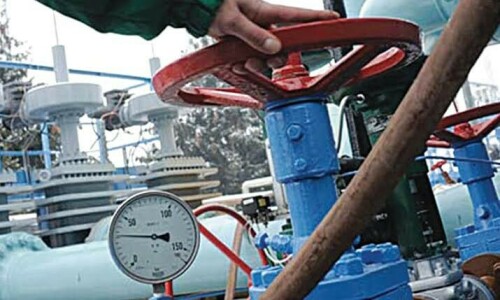
KARACHI: The US dollar crushed the local currency once again on Thursday as it was traded as high as Rs190 in the interbank market but finally closed with an appreciation of Rs2.05.
Currency dealers in the interbank market said the importers were facing difficulties in buying dollars from banks. The closing price was Rs188.18, according to the State Bank of Pakistan (SBP).
“Banks were reluctant to sell dollars before the final outcome of the ongoing political crisis, which is the main factor that has accelerated the rupee’s depreciation,” said Atif Ahmed, a currency dealer in the interbank market. He said the market expects further weakening of the rupee on Friday, the week’s last trading day.
The rupee lost 5.1pc value against the US dollar during the last 17 sessions. On Thursday, the local currency fell by another 1.09pc while during the current calendar it has depreciated by 6.2pc against the dollar.
Importers facing difficulties in buying greenbacks from banks
The traders and industries have been asking the SBP to stop this free fall of the rupee as the high-cost imports have been inflating the economy.
SBP Governor Dr Reza Baqir, whose tenure is ending in the first week of May, had introduced the free-float exchange rate and kept advocating the mechanism.
However, the steep fall of the rupee against the US dollar collapsed the exchange rate mechanism. Currency dealers and bankers said there was no tool with the State Bank to control the current bullish dollar trend.
Reserves depleting
At the same time, the foreign exchange reserves of the State Bank have been falling every day mainly due to debt servicing. The reserves of the SBP further declined this week by $728 million to $11.3b, the lowest since June 2020.
“The devaluation would compel the government to de-cap the petroleum prices since the loss of revenue will increase significantly. The relief given by the government on electricity bills will also be taken back,” said Samiullah Tariq, head of Research at Pak-Kuwait Investment and Development Company.
The oil and diesel prices were fixed till the announcement of Budget 2022-23. Any government which de-caps the prices would have to pay a heavy political cost but the researchers said the government needs to improve its revenue.
Mr Tariq said there is also a need to arrange a rollover of the $2.3bn Chinese syndicated loans which were paid back by the State Bank last week. The Chinese foreign minister had assured his Pakistani counterpart rollover of the amount. However, the changed political situation which turned into a crisis could not attract the Chinese attention for the rollover of this amount.
“There is another problem that banks have kept their foreign exchange reserves in Nostro account (out of the country for payments against any deal). If this amount is not brought back, the reserves of the commercial banks will also start falling,” said a senior banker.
“The rupee crash is mainly driven by political uncertainty rather than economic deterioration,” said Komal Mansoor of Tresmark.
“This is the highest rate hike in over 2 decades but was necessary to counter not only runaway inflation and currency depreciation but also to arrest speculative forces from taking hold,” she added.
The State Bank said in its monetary policy statement that the heightened domestic political uncertainty contributed to 5pc depreciation in the rupee and a sharp rise in domestic secondary market yields as well as Pakistan’s Eurobond yields.
Published in Dawn, April 8th, 2022













































